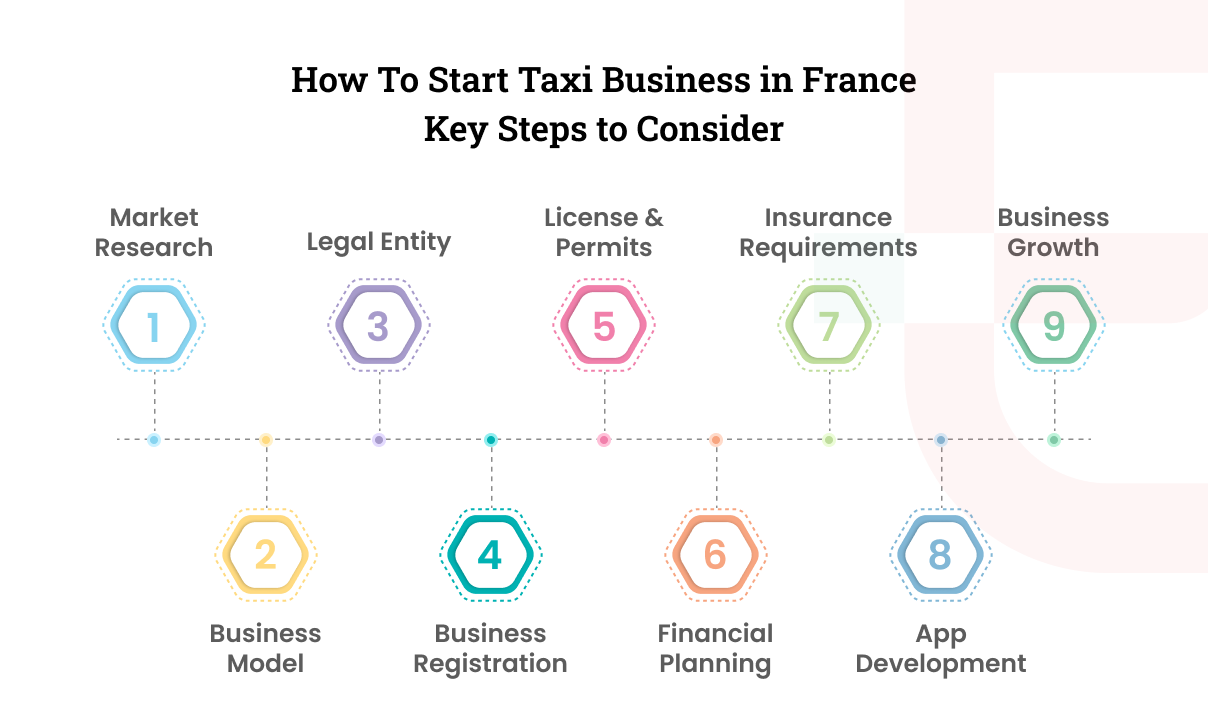
As a renowned tourist destination, France boasts a thriving transportation network, and taxis play a significant role in it. The French taxi sector is rapidly growing, inspiring entrepreneurs to enter the market. If you desire to capitalize on this booming economy but don’t know how to start a taxi business in France, this article is for you.
- How To Start a Taxi Business in France: Key Steps to Consider
- Navigating the Legal Requirements to Establish a Taxi Company in France
- Why Start a Taxi Business in France? Exploring the Country’s Taxi Market
- Major Differentiation Between Taxi Services in France
- Key Competitors in the French Taxi Business Market
- Conclusion
- FAQs
We will go through a step-by-step guide to starting a taxi venture. It will also give a glimpse of Europe’s thriving taxi sector and shed light on the competitive landscape in the French taxi market.
So, let’s explore how you can get started.
How To Start a Taxi Business in France: Key Steps to Consider
The French taxi industry is highly regulated, where entrepreneurs must undergo lengthy business registration and licensing processes. If you don’t know how to start a taxi business in France, you may find the entire process a bit confusing and overwhelming. We have broken it down into clear steps to make it smooth for you.
1. Conduct Market Research
Before you start a taxi company in France, understanding its market is essential. Begin by researching your target audience. Analyze demographics and psychographics, including factors such as age, occupation, behaviors, interests, and challenges that may influence the target audience.
In parallel, you should also research the competitive landscape to gain a deeper understanding of your target market.
Conduct a thorough analysis of your competitors to evaluate their services, marketing strategies, and overall business structure. The goal of this research is to identify market gaps and create services that address them.
2. Choose the Right Business Model
When deciding on a business model, you’ll come across several options. Here are the most popular ones:
Traditional Taxi Service Business
In this model, you’ll operate as a traditional taxi service provider that offers voice call-based or in-office booking facilities. You will own your vehicles and hire drivers as full-time or contractual employees to provide services.
Franchise Model
This model is best for entrepreneurs who want to start a taxi company but lack resources and need guidance. As a franchise owner, you will work under a well-established taxi firm and leverage their brand to establish your business.
Partnership with other operators
This could be a great option for entrepreneurs who already have an established taxi business but want to take it online through digital platforms. You can partner with ride-hailing companies like Uber and leverage their platform to receive ride requests from their users.
Ride Aggregation
Building your own ride-hailing platform can be a rewarding venture in today’s tech-driven taxi market. Ride aggregation is an on-demand business model where you’ll offer a digital platform that connects passengers with independent drivers, earning a commission for each ride booked.
3. Select the Right Business Structure
A business structure is a framework that defines how your business is legally organized and structured. Depending on your unique structure, you will select from these:
- Société par Actions Simplifiée Unipersonnelle (SASU)
A single-owner company with a separate legal identity. Business owners are not personally responsible for business debts and losses, making it ideal for solopreneurs who want protection and flexibility.
- Société par Actions Simplifiée (SAS):
A business with two or more partners who are only responsible upto their share capital. This structure is more popular among multi-owner startups and growth-focused companies.
- Société à Responsabilité Limitée (SARL):
A commercial company with a separate legal identity. Designed for 2 to 100 stakeholders, this structure offers a systematic framework and protection against liability, but it’s also less flexible than SAS.
4. Registering Your Taxi Service Business
From 2023 onwards, all business registrations must go through the Government’s Guichet Unique portal, managed by INPI (Institut National de la Propriété Industrielle).
Before you start the registration process, be prepared with all the essential documents in PDF format.
You will need:
- Articles of Incorporation (Statuts de Société): Must include company name, purpose, capital, registered office, management structure, etc.
- Signed affidavit (Déclaration de non-condamnation): This certifies that the director has not been banned from managing businesses.
- Proof of Business Address: This could include either a lease, a domiciliation contract, or a utility bill.
- President or Manager ID proof: Passport, ID card, resident permit (if not a citizen of the European Union)
- Capital deposit certificate (Attestation de dépôt de fonds): Bank certificates showing capital has been deposited to the Business bank account (for SASU, SARL)
- Publication of legal notice (Annonce légale): You are required to publish a company formation notice in a local, authorized, legal newspaper.
Upon successful registration, you will receive:
- Confirmation of submission
- SIREN/SIRET numbers (business identifiers)
- Kbis extract (official company registration proof)
This might take 3 to 10 business days.
5. Navigating Financial Complexities
Starting a taxi company in France can be an expensive feat. First, you’ll need business licenses and permits, which make up significant initial costs. In some cities, taxi licenses are limited, and you might need to purchase them from existing operators, which might cost tens of thousands of euros.
Depending on your chosen business model, you may need to invest in a fleet of vehicles. Ensure you acquire high-quality vehicles and tools, such as taxi meters and GPS, to enhance your cab services.
To meet these business expenses, you will need enough financial resources. Consider taking out bank loans or crowdfunding as an option. Alternatively, you can also opt for angel investors or venture capitalists.
6. Purchase or Lease Vehicles
If you want to start a traditional taxi business that operates its own vehicles, you need to purchase a fleet of vehicles. Make sure your vehicles adhere to all the government-mandated standards and regulations.
If you’re starting with a limited budget, you can also partner with a car dealership or leasing companies to lease the vehicles.
7. Hire and Train Drivers
Hiring and training drivers is a fundamental aspect of running a successful, safe, and reputable taxi business. Therefore, conduct a thorough background check to ensure your drivers comply with all the safety and professional regulations set by the French government.
If you offer app-based services, you might also have to offer training on technology operations, fare structures, and emergency procedures.
8. Finding the Right Tech Partner
The skills of your tech partner will define the quality of your taxi platform, so make sure you hire the right team of taxi app developers who have delivered successful results.
Once your partner is decided, form a project timeline that includes all the key milestones. Define the report frequency and provide your feedback as the development progresses.
After rigorous development and testing cycles, your app will be ready to publish on the App Store and/or Play Store.
9. Marketing & Scaling Your Taxi Firm
Once your business app is launched, your job is to promote your taxi company in order to attract more customers. Develop a robust marketing strategy incorporating both digital and traditional channels to maximize your reach.
Strategic partnerships with enterprises and hotels can also help you expand your services, paving the way for business scaling. As you progress further, you would also want to expand your offerings to include electric vehicles and bike taxis to stay competitive in the market.
Besides this, you can also join your local taxi unions for support, exposure, and a fair, competitive environment. You can join some notable unions like Fédération nationale du taxi (FNT) and Union nationale des taxis (UNT) or check for local ones in your region.
Join the League of Leading VTC Operators in France with a Powerful Platform Like Uber.
Navigating the Legal Requirements to Establish a Taxi Company in France
Establishing a taxi business in France involves many rules and regulations that you must meet in order to operate your business legally. Here are some common legal requirements you must consider before starting a taxi company in France.
Vehicle Registration & Standards
Vehicle registration is required for both traditional taxi services and VTC operators. For this, you may need to:
- Register the vehicle under your company’s name
- Pass Contrôle Technique (roadworthiness test)
- Install a taximeter and light signals (only on traditional taxis)
Before you launch your vehicles on the roads, they must meet these specific standards:
- Taxi vehicles should not exceed 5 to 7 years of age, unless they are electric or hybrid, which may be eligible for a longer allowance.
- Must be a four-door vehicle, typically a sedan, estate, or van, with a spacious interior.
- It must have a minimum of 84 kW engine power.
Driver’s Criteria
Your drivers must meet certain eligibility criteria mentioned here:
- They must hold a Category B French or EU Driving License for at least 3 years.
- Must have clean criminal and traffic violation records.
- They have to pass a medical fitness examination approved by doctors certifying their fitness to drive a taxi.
- They also have to complete a certified taxi training course offered by authorized centers.
- They have to pass the Certificat de Capacité Professionnelle de Conducteur de Taxi (CCPCT), which includes both written and practical tests. This test is organized by the local chamber of commerce and industry (CCI).
- Every 5 years, they must complete a one-day refresher course to maintain their license.
Insurance Coverage
While there may be numerous insurance types with different coverage, these are the basic ones that you must purchase:
- Professional Liability Insurance (Assurance de Responsabilité Civile Professionnelle)
- Commercial Vehicle Insurance
- Driver and Passenger Coverage
- Loss/Damage/Theft Coverage
Permits and Licenses
Your license requirements depend on the type of business you choose. Here are the detailed permit requirements for both traditional taxi service and VTC companies.
For Traditional Taxi Service:
To operate a traditional taxi business, you will need two essential permits and licenses.
Taxi Driver Permit (Carte Professionnelle de Conducteur de Taxi)
To acquire this permit:
- Apply via the local Prefecture.
- Pass a taxi exam (conducted by the Chambre de Métiers et de l’Artisanat (CMA)).
- Submit several documents like a clean criminal record, a valid French/EU driving license, and a medical fitness certificate.
Taxi License (ADS – Autorisation de Stationnement)
To acquire this license, you can either:
- Apply to the Mairie (town hall). This is offered at no cost, but due to limited availability, a waiting list may be established.
- Purchase from an existing taxi driver. It may cost between €30,000 and €300,000, depending on the city.
For VTC (Ride-Hailing):
To form a ride-hailing company, you generally require a driver’s card and an operator’s license.
VTC Driver Card (Carte Professionnelle de Conducteur VTC)
To get this, you have to:
- Apply at the local Prefecture
- Must pass VTC exam (conducted by CMA)
- Complete VTC training (Minimum 14 hours)
- Submit a clean criminal record and a valid French/EU driving license.
VTC Operator Registration (Registre des Exploitants VTC)
To get this license, you have to register online via the DREAL/Ministry of Ecology VTC Operator Portal.
Why Start a Taxi Business in France? Exploring the Country’s Taxi Market
The French taxi sector is experiencing rapid growth, driven by tourism, technological advancements, changing customer behavior, and widespread adoption of ride-hailing apps like Uber and LeCab.
As per the report published by Mordor Intelligence, the market is estimated at USD 2.64 billion in 2025, and is expected to reach USD 4.20 billion by 2030. This almost doubled revenue presents a unique landscape with opportunities for new entrepreneurs.
To make it more compelling, we’ve shared some remarkable points indicating why starting a taxi business in France could be a profitable venture.
High Demand in Urban Centers and Tourist Areas
France, with its significant urban population and thriving tourism sector, has a consistent and high demand for transportation services. Cities like Paris, Lyon, and Marseille are major hubs experiencing the surge of reliable taxis.
Government Support
To encourage entrepreneurship, the French government has implemented incentives and schemes like ACRE (Aide à la création ou à la reprise d’une entreprise), which offers a partial exemption from social security contributions for the first few months of a new startup, offering financial aid during the critical business stage.
Untapped Niche Markets
While major cities like Paris and Lyon are competitive, there are ample opportunities in less saturated areas, specialized services (like airport rides, luxury transport, corporate taxi services), or in specific demographics (like females, children, people with disabilities).
Major Differentiation Between Taxi Services in France
In France, taxis are divided into two categories: Traditional taxis and VTC (Véhicule de Tourisme avec Chauffeur).
Here’s a detailed differentiation between them:
Traditional Taxis
These taxis are similar to New York’s yellow taxis or London’s black cabs. However, they don’t have distinct colors as per these two cities. Traditional taxis are easily recognized by a taxi sign mounted on top of them.
These taxis can be hailed on the street or found at a designated taxi stand. The fares are regulated by governments and can vary based on city, distance, or time of day.
Moreover, just like the Medallion system in the US, France also limits the number of taxi licenses (called autorisation de stationnement or ADS) issued per city.
So, acquiring a taxi business license can be a bit challenging. You might need to wait for years to get one or buy from existing license holders, which might cost several thousand Euros.
VTC
Stands for Véhicule de Tourisme avec Chauffeur. VTCs are similar to Uber or Bolt. They don’t have a distinct sign like traditional taxis, but they must have a license to operate as private drivers, and the license should be visible on the windshield.
VTC taxis face some stringent regulations. For example, VTC drivers are not allowed to pick up passengers from the streets. They must be booked in advance through mobile apps or websites.
However, they get a lot of freedom when it comes to deciding fares. Unlike traditional taxis, the fares are determined by the VTC companies based on time, distance, increased demand, and other such factors.
Moreover, VTC companies face fewer regulatory hurdles compared to traditional taxi companies, making them an ideal choice for modern entrepreneurs who want to start a taxi business in France.
Summarizing the differences:
| Differentiating Parameters | Traditional Taxis | VTCs |
|---|---|---|
| Similar to | Newyork’s Yellow Taxis or London’s Black Cabs | Ride-hailing platforms like Uber or Bolt |
| Appearance | Have a “Taxi” sign on top | Have an operational license on the windshield. |
| Fare regulations | Regulated by the government | Regulated by VTC companies themselves |
| Operational Rules | Can be hailed on the streets | Must be pre-booked through the app or websites. |
| Regulatory challenges | Limited license allocation | No significant regulatory challenges |
Key Competitors in the French Taxi Business Market
The French taxi business market includes both traditional taxis and ride-hailing platforms. With the increasing popularity of app-based cab services, some traditional taxi businesses have also started pivoting to digital platforms.
This tech-driven approach has helped secure a significant market share in a space dominated by global giants like Uber. Let’s explore the top competitors in France’s taxi sector.
Uber
Uber has been a dominant player in the ride-hailing sector in France as well. French riders have seamlessly adapted to the Uber business model that facilitates faster and seamless cab booking.
Free Now
Free Now is an application that connects customers with both traditional taxi services and ride-hailing drivers, offering a hybrid approach to transportation.
LeCab
LeCab offers private chauffeur rides across France. The company stands strong against ride-hailing giants like Uber with its wide range of vehicle options and keen focus on quality service.
G7
G7 is a leading taxi service provider in France, having a strong presence in Paris. With its 10,000 taxis and omnichannel cab booking, it strives to provide an excellent experience to customers.
Conclusion
Building a taxi venture can be effortless if you accurately follow the steps outlined here. Now that you have a thorough knowledge of how to start a taxi business in France, it’s time to get into action mode. Start by researching your target audience, and let us handle the technical part.
With Elluminati’s robust white label taxi app, you’ll receive end-to-end support to drive your taxi venture forward. It has high-end features and advanced capabilities that make your business operations effortless and offer a seamless experience to your customers. Interested in learning more about our product? Contact us today!
FAQs
The cost of building a taxi booking app starts from €7 000. However, the final cost may vary depending on your specific business requirements. If you want more personalized quote, we recommend connecting with our sales executives at sales@elluminatiinc.com.
While the actual timeline may depend on your unique business needs, launching a taxi startup in France may take anywhere from a few weeks to several months. To determine the exact duration, you need to consider the time it may take to acquire licenses, receive funding, develop an app, and so on.
Taxi companies typically generate revenue through various channels, such as:
- Renting cabs to the drivers
- Taking commissions from drivers
These are the basic revenue sources for taxi service businesses. If you build a digital platform, you can also earn from platform fees, subscriptions, and more.
Focus on personalized services, offer competitive pricing, and build a loyal customer base through discounts and referral programs. These strategies will help you effectively compete with platforms like Uber.












